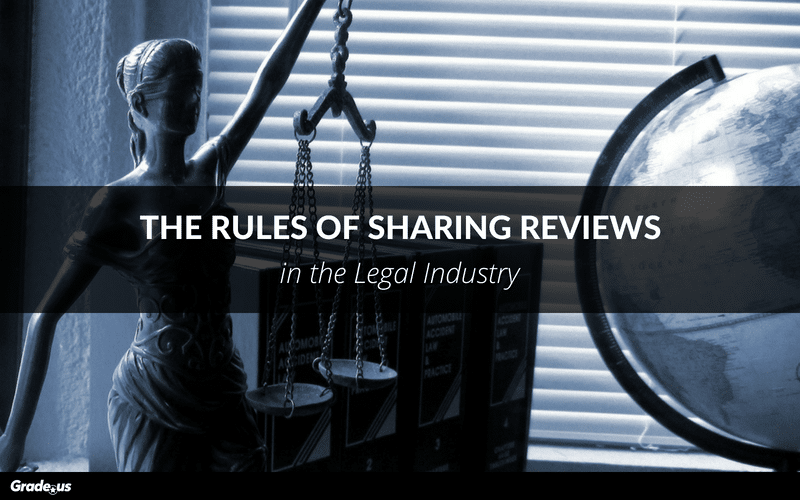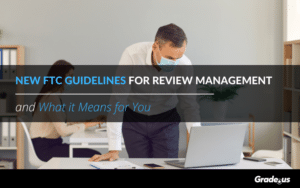Reviews aren't complicated.
You do amazing work, then you ask your clients to talk about it. Simple, straightforward and easy, right?
When it comes to lawyer reviews, not so much.
If you're a lawyer, this is a problem.
The Modern Firm lists review or testimonial pages as one of the most visited pages on law firm websites. Research shows lawyer reviews and testimonials are an incredibly effective way to win new clients.
· 83 percent of clients use reviews as their first step in the research process
· 70 percent of clients would travel to work with an attorney who had better reviews
· 43 percent of clients use reviews to select an attorney
If you're unprepared this is a crisis in the making.
A review is a crisis when you don't know the rules
You're an attorney, of course you know the rules.
You're a legal specialist so this means you know the laws in your jurisdiction. If you're like most attorneys, you pride yourself on your expertise and legal acumen.
And there lies the problem.
It's common for attorneys to outsource their work. To rely on professionals who are skilled at important tasks like accounting, marketing or support.
But they don't know the law.
Not like you do. Most of these support professionals aren't aware of the rules, regulations and laws governing online reviews. Attorneys are typically looking for a way to decrease their involvement in these administrative tasks.
What about marketers?
If you’re a marketer, agency or consultant, this is an opportunity for you differentiate yourselves. Most marketers won’t bother to learn the rules. If you take the time, you instantly elevate yourself to the role of credible and trustworthy advisor.
What about boutique law firms?
These small law firms are often overwhelmed. They're drowning in work, paddling as fast as they can to stay afloat. Most are slowly losing that battle.
It's easy to forget the rules in this environment
Your support professionals may have a few important questions (which they may be too embarrassed to ask).
What are the rules?
Who sets these rules and what gives them the authority to do so? These questions are reasonable, straightforward and precise. If you're an attorney, this is most likely old news.
You probably don't have the time to explain this in detail to your support professionals so we'll cover the basics for their sake.
Let's start with who.
The American Bar Association (ABA) set the standard with their Model Rules of Professional Conduct. The ABA isn't a governing body so most states / jurisdictions choose to adopt their recommendations (or not).
What are the rules?
This isn't the right question. It's not a question of "what" it's a question of "which." Which rules should you follow in your jurisdiction?
Here's a starting point for your own research and due diligence.
Updated:
It’s important to truly highlight that the ABA only set a standard. They do not set the laws, the states do.It is incumbent on any marketer or attorney to follow the laws of their state and to conduct their own research.
H/T to Gyi Tsakalakis
Rule #1: Your reviews should avoid false, misleading or non-verifiable statements
The ABA's comment on Rule 7.1 states:
1. This Rule governs all communications about a lawyer's services, including advertising permitted by Rule 7.2. Whatever means are used to make known a lawyer's services, statements about them must be truthful.
2. Truthful statements that are misleading are also prohibited by this rule. A truthful statement is misleading if it omits a fact necessary to make the lawyer's communication considered as a whole not materially misleading. A truthful statement is also misleading if there is a substantial likelihood that it will lead a reasonable person to formulate a specific conclusion about the lawyer or the lawyer's services for which there is no reasonable factual foundation.
3. An advertisement that truthfully reports a lawyer's achievements on behalf of clients or former clients may be misleading if presented so as to lead a reasonable person to form an unjustified expectation that the same results could be obtained for other clients in similar matters without reference to the specific factual and legal circumstances of each client's case. Similarly, an unsubstantiated comparison of the lawyer's services or fees with the services or fees of other lawyers may be misleading if presented with such specificity as would lead a reasonable person to conclude that the comparison can be substantiated. The inclusion of an appropriate disclaimer or qualifying language may preclude a finding that a statement is likely to create unjustified expectations or otherwise mislead the public.
4. See also Rule 8.4(e) for the prohibition against stating or implying an ability to influence improperly a government agency or official or to achieve results by means that violate the Rules of Professional Conduct or other law.
There's a bit of legalese here but it's basically stating that:
· You can't lie (falsify or omit) in your communication
· Don't use the truth to lie (e.g. create implicit and unrealistic expectations)
· This covers any communication that discusses your services
This seems incredibly straightforward, doesn't it? Until you realize you can't use a portion of the client reviews on third party websites on your own site.
Rule #2: Lawyer reviews are allowed, if you use an appropriate disclaimer
A disclaimer is required or recommended for the most part. There are several states that require specific disclaimers; some regulate reviews and testimonials.
Attorneys understand why.
A disclaimer means you're far less likely to mislead or confuse potential clients. It reduces the likelihood that you'll be accused of intentionally misleading potential clients.
Make sense, right?
Let's say your new law firm wins a $1.7 million dollar settlement. It's your first big win. So you create a case study, write things up and post it on your website, along with your client's review.
You shared the results.
You didn't promise that you'd get the same results for each and every client. But that's exactly what most clients will assume. You did it for them so why can't you do it for me? Your support teams (marketing in particular) will assume the same.
They may not want to use a legal disclaimer.
But, you'll create one anyway. You'll write up something that's helpful and clear. Like this:
"These results do not imply we can get the same or similar results for your claim. While there may be some similarities each case is as different as a snowflake."
It sets clear boundaries for your prospective client, marketing and support teams.
Rule #3: Follow the prohibitions, restrictions and guidelines of your state's advertising and solicitation rules
Read through state advertising and solicitation rules and you'll notice there are a lot of prohibitions and restrictions.
Most of this covers advertising, right?
Actually, no.
Most of this covers communication.
Some of these prohibitions cover testimonials (reviews) and endorsements explicitly. Each of these examples can apply to online reviews, specifically the reviews you share either on your website or on a profile claimed by the firm (e.g. Yelp).
· Prohibition and restrictions on testimonials or endorsements. Does your jurisdiction frown on communication (reviews) that mention your law firm in a leading or subjective manner? Are you expected to disavow or disclaim inappropriate reviews?
· Prohibition on statements that cannot be substantiated or verified e.g. "I went to lawyer. He was attentive and helped me with my issue" vs. "Lawyer is the beesst! #1 lawyer in america, and better than anyone else."
· Prohibitions and restrictions on statements regarding past success or previous results. "Of course Jan won a large settlement for me and my family (that's what she does), and her post-settlement suggestions (which financial firms to look at to invest the bulk of the settlement) were an added bonus."
· Prohibition on communications that create false expectations or imply that lawyer can achieve. "If I EVER have any legal troubles, (let's pray I don't) there won't be a second thought about who I'm calling. If my friends or co-workers have legal troubles they will be quickly referred to Mr. Nucciarone. The bottom line is when you are having legal troubles you want one thing... a lawyer that's going to win your case. Charles Nucciarone is a WINNER."
· Prohibition on communications that imply improper influence. "Steve knew everyone! He played golf with my judge, and he was good friends with the Kane county DA. He was able to get me a deal other attorneys couldn't! Simply the best."
· Prohibition or restriction on comparing quality of lawyer’s services or describing quality of services. "When hiring an OVI lawyer you want two things - someone who knows the local court system and someone who knows the OVI laws better than anyone else in the system. Rick at Rosen and Randolph fits that to a tee. He was more knowledgeable than my previous firm, Carlisle and Shoop."
This isn't a comprehensive guide.
Still though, see how this complicates the lawyer review process? This isn't as simple as attracting a large amount of reviews. It's about attracting the right kind of client reviews.
Your jurisdiction establishes the do's and don'ts
It's easy to attract amazing reviews and a consistent stream of clients if you know the rules. Ignore the rules and you create a potential crisis for your firm.
You're an attorney, you already know the rules.
Your support professionals don't know the rules. It's your job to share these rules with your support staff. What if it's just you and a small team? It's easy to forget the rules when you're overwhelmed.
If you're an attorney, point your support team in the right direction. If you're running a small firm and you're a do-it-yourselfer, create systems and procedures to help.
The ABA sets the standard.
It's not a question of "what" it's a question of "which." Which rules should you follow in your jurisdiction? You know the answer. Share it with your team and they'll find reviews aren't complicated.
About the Author
Andrew McDermott
Andrew McDermott is the co-founder of HooktoWin. He shows entrepreneurs how to attract and win new customers.











